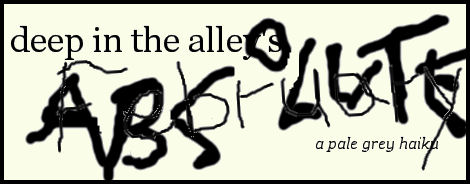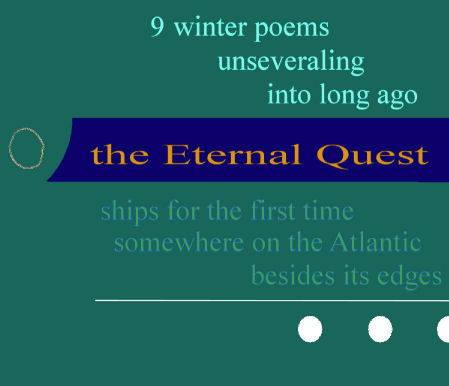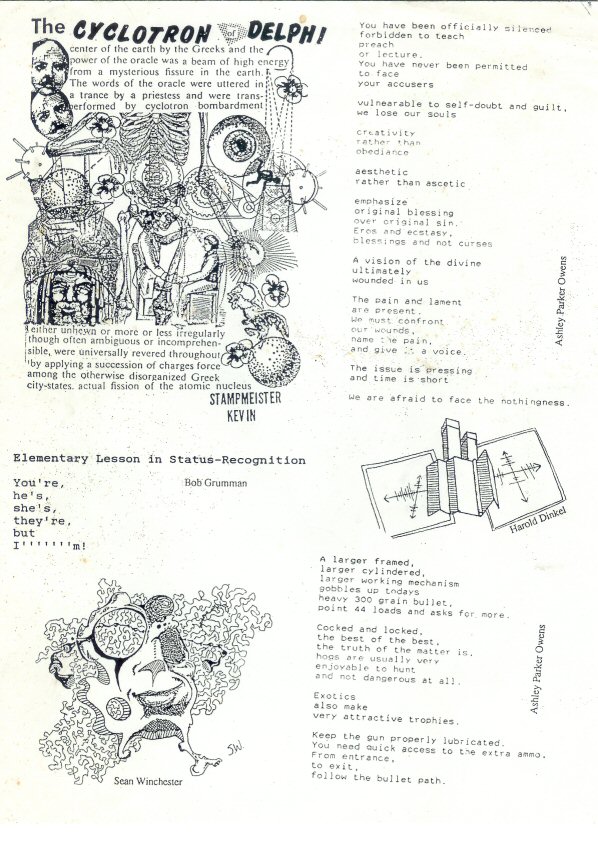Posts Tagged ‘haiku’
Entry 134 — Ellipsis-Haiku
Wednesday, May 26th, 2010
Entry 133 — Somewhat Awake Again, I Think
Friday, May 21st, 2010
I simply disconnected from my blog–just didn’t think of it for about a week until a day or two ago. Then last night for some reason I started thinking about haiku and came up with the following poems that I thought worth making this entry for:
.
. early April night:
. barely a single haiku
. of moonlight in it
.
. the street’s cherry blooms,
. dazzling, yet almost grey
. besides the haiku’s
.
.
.
.
.
Entry 52 — Some Conventional Haiku
Wednesday, December 23rd, 2009
Today’s entry is a repeat of one from Christmas day, 2005, with a few comments from today at the end of it:
25 December 2005: “clenched sky.” That’s one of the scraps in the notebook yesterday’s entry was about. Circa 1983. Never got into any poem of mine but may yet. Another scrap is the start in fading cursive of a sonnet I completed somewhere else on Dylan Thomas. I was momentarily quite taken by what the word, “steepled” did to its fifth line, “by his construction of a steepled truth,” for it took a while for me to realize the word was not “stupid.”
Other highlights include the following five unpublished haiku:
rain now as loud
against the northern side of the house
as the roof
rotting log
only part of forest floor
to show through melting snow
glimpsed tanned shoulder;
thin white string across it,
tied like a shoelace
bikini-bar dancer
showing off to her boy-friend,
me in between them
far enough from the storm
nearing the color-dotted beach
to see above it
I wrote these about the time I pretty much stopped writing conventional haiku. I quite like the storm one, probably because I still vividly remember the first Florida storm I saw from far enough away to see above–and to both sides–of it. I don’t think it’s a truly outstanding haiku, though. The one about the bikini dancer is fair in the wry sardonicism vein, I think. The one about the bikini string is nearly not a haiku, for it doesn’t really provide any haiku contrast; i.e., it’s a single-image description. On second thought, maybe it’s excitement versus the mundane: girl in bikini versus shoelace.
I dunno. The other two are very standard, but I’ve tried to improve them,anyway:
the rain now louder
against the house’s north side
than on the roof
rotting log:
only portion of the forest floor
to show through the snow
The first is slightly haikuish in the way it obliquely discusses a wind; the second re-uses a very over-done haiku theme, to wit: life goes on, or–more specifically–winter snow won’t win; but the theme is slightly warped toward freshness with the use of something a reader will take to represent a cohort of winter rather than a counter to it, until he realizes the cause of rotting.
Also in the notebook this bit of High Sagacity: “The Eastern Wise Man attempts to reduce his awareness to the size of his experience; the Western Wise Man attempts to increase the size of his experience to the size of his awareness.” Yep, I’ve always been Eurochauvinistic.
From today:
rotting log;
nothing else of the forest floor
showing through the snow.
Entry 23 — An Old Haiku of Mine
Tuesday, November 24th, 2009
Today was another bad day for me (because both my bikes had flat tires so I had to walk to where I had an MRI for my bad back, then walk to the bicycle shop two miles from there to get tubes before going on home, another two miles, so I’m just going to post one entry from my old blog, #631, in its entirety–because it’s one of my best entries for the general poetry public, I think:
24 October 2005: Well, we lost electricity in my neighborhood for seven or eight hours due to Wilma, but we got through it with minimal damage. Naples, to the south, didn’t do so well. Sad for them, but someone had to lose–and one good thing about the outcome is that the weather people seem to have been on top of things all the way through, which is certainly reassuring. In my ideal world there’d be hurricanes–but the land to persons ratio would be so high no one would have to live anywhere near places like Naples. There’d still be places like Naples, but they would be staffed by commuters, and lived in by vacationers. (Down with over-population–which in my book is anything over ten million–for the whole world.)
Okay, the poetry-related subject of this entry is the following poem:
. 2 children’s
. rained-around dry quiet spot
. within forsythia
This, or something like it, was in my first book, poemns. After selling some of the copies of the book, I found something wrong with one of the other three poems on the sheet it was on, so removed the whole sheet from the remaining copies of the book. I think the printers failed to make a line in one of the poems go off the edge of the page as I’d intended it to. I should have a copy of the four poems somewhere but it’d take me a week to find them if I tried to, I’m sure.
I’ve used this poem elsewhere since the book, I believe. I want to discuss it here cbecause I consider it a near-perfect example of what I try for as a poet, which is simply to render, in as few words as possible, an image that will cause others as much pleasure as possible. This one accomplishes this through its (1) subject matter, which is (a) quotidianly likely to elicit most persons’ sympathy, (b) pretty, children generally coming off as cute, and forsythia as beautiful, (c) peaceful, the rain having to be little more than mist not to be getting through forsythia branches, and, most important, (d) archetypally resonant by representing Shelter and Companionship, as well as Spring (rain and forsythia, and human beings in their spring); and its diction, which includes the wonderful rained/round rim thyme (but, not, I’m sure that’s not original with me), the with/syth near-=rhyme and the dry/qui aft-rhyme (or whatever it is I’m calling traditional rhymes). Only now, by the way, did I realize that the latter rhymes were near- or full-rhymes. The poem is also effectively concise, and it draws on its being a haiku, for that adds haiku-depth to it (via what it picks up from the tradition, and all haiku before–and after–it).
To me, one of its points of greatest interest is in what it does not have, mainly, manywhere-at-once, or equaphorical layering. In a way, this is a virtue, for it clarifies it into a moment of particular intensity. Amusingly, that emphasizes its being a pure haiku–albeit one without quite the right syllable-count. I do consider its lack of equaphors (or metaphors and the like), in the final analysis, a defect. I continue to believe the very best poems express two or more simultaneous images. But poetry as a whole would suffer consequentially if every poem were equaphorical.
Real life did inspire the poet, by the way. The forsythia in it is from the yard of the Hyde House, as it was known, on Harbor View Island in Norwalk, Connecticut, that I lived in between the ages of 7 and 12. It actually formed a sort of hut, though I’m not sure they could have kept out even mist. I played in it from time to time but most remember my sister Louise, a year younger than I, playing some kind of queen’s court game in it with her friends Ellen and Cindy.
Ironically, just the other day I learned that the Hyde House I’ve been reminiscing about is no more. It was leveled to make way for two condominiums that have to be devastating the ambiance of the shabby-genteel little clump of mostly vacation homes on the island. Progress triumphs again.
note: the large print is stupid, but I’m using it to indicate large blocks of quoted material because I haven’t been able to figure out how to indent at this site (other than use periods as with the poem quoted within my quote–which would take too long to get right for long prose passages).
Entry 18 — More Comments on Old Blog Entries
Thursday, November 19th, 2009
In #622, #623 and #624 I apparently had little to say so presented a few snippets of autobiography–and the following poems done for jwcurry, some of them possibly in collaboration with him calling himself Wharton Hood:
. peeling out of
. a bullet’s stipend
.
. her skirt
. crows
. skhert splhurt
.
. cats sleep the sky here
.
. flowers strip
. footsteps
. to the moon
.
. pond
. dusk
. Pan’s thoughts
. appled in place
.
. eyesigh pray supherSkIrT
.
. miles of 3. a.m.
. after the
. haik
.
And that’s all for now, for i”m deep in another null zone.
Entry 10 — Nonsense, Etc.
Wednesday, November 11th, 2009
Okay, back to Geof Huth’s haiku and why I consider it a specimen of nearsense, and what that means:
. the car I didn’t notice isn’t there
This could be temporary nonsense, or a text that at first seems not to make sense but later does. Its speaker may simply have driven his car past another car without noticing the other car. At that point a companion’s remarking, “Hmmm, that car must be over fifty-years-old,” might cause the speaker to look in the direction where the old car should be and seeing no car–because it has moved. He never noticed the car but knows it was there although it has gone.
The problem with this is that no companion is mentioned. Moreover, the incident seems too minor to form the basis of a poem. So I take it to be a paradox: one can’t notice that one has failed to notice something. One can’t think there is a car somewhere that one did not notice since to do so indicates one noticed it. Or can one notice not noticing? It’s very confusing–coming close to making sense but never quite doing so. It’s not pure nonsense (as a form of literature meant simply to amuse) nor is it willfully and sadistically completely meaningless the way constersense is. There is thus something about it that gives pleasure–the way an optical illusion does, or the paradox, “This sentence is a lie.”
My tentative explanation for the pleasure is that we like reminders that existence is not wholly rational, wholly predictable. The paradox performs a variation on the theme of reason. It makes enough sense to prevent anger, but not enough to be fully satisfying in the long run–as a paradox. But Huth’s poem is more than a paradox: it captures a human feeling we all have of suddenly being discontinuous with Existence–lost. The universe has gone left while we were continuing right.
The difference between nearsense of this kind and constersense is that we share the feelings of the creator of nearsense but are the victims of the creator of constersense (unless we share his contempt for those who want existence to be reasonably reasonable and enjoy thinking of the pain he is inflicting on them).
Entry 9 — Poetry Employing Irrational Language
Tuesday, November 10th, 2009
I have always wondered why anyone would make much of most Dada works. It was evident that a good number of reasonably intelligent, sensitive people have, though. Including friends of mine who have shown themselves quite capable of fashioning works I think vastly superior to their Dada works.
Then I came upon Geof Huth’s
. the car I didn’t notice isn’t there
in the recentest issue of Haiku Canada Review. Not Dada, but certainly nonsense, or so I at first thought. I would now term it nearsense. As
. the crab boils filge at blargets in the goamy fludge
it would have been nonsense, or a literary work which uses irrational language in order to amuse (in the view of most knowledgeable people encountering it). As
. car didn’t (e time)s into bleep blegg bllllg you
it would be constersense, or a literary work whose textual matter seems chosen for no other purpose than to cause consternation–by seeming to be nearsense but ultimately not making sense, or proving amusing.
Then there’s temporary nonsense such as Joyce’s “cropse,” which at first seems either nonsense or constersense (and will always seem constersense to Philistines) but, given time, will quite rationally if poetically say “corpse” and “crops” simultaneously in succinctly sum up all the important cycles of human existence.
I have more to say about this, particularly about why the poem by Geof Huth is nearsense, but I’m too worn-out from another tiring day to do so until (I hope) tomorrow.
Entry 8 — Thoughts on Haiku
Monday, November 9th, 2009
A new Grummanism today, “constersense,” to go with an old one, “nonsense,” and one in between old and new, “nearsense.”
One item always worth taking a look at in the Haiku Canada Review is the page on which N. F. Noyes discusses haiku he likes. One of them got me thinking about nonsense
. the car I didn’t notice isn’t there
It’s by someone calling himself G. A. Huth. About this Noyes says, “From a fourteenth century poet I quote: ‘Generally speaking, a poet requires some understanding of emptiness.’”
(An amusing comment to make in a discussion of the World-Expert in the praecisio. See Geof’s blog for details on that if–shame on you–you don’t know what it is.)
Noyes goes on to say, “Here the sudden emptiness provides a strong “Aha!” experience, despite a seeming diregard for the haiku’s chief guideline of close observation, in ‘I didn’t notice.’”
(But I would contend that what the poet closely observed with his act of not noticing.)
Noyes was reminded of a haiku by Buson:
. Tilling the field:
. The cloud that never moved
. Is gone.
The other two haiku Noyes liked (as did I) are:
. a kicked can
. cartwheels
. into its echo –Jeffrey Winke
. transplanting
. four rose bushes
. transplanting bees –Liz fenn
More on nonsense and related matters tomorrow, if I’m up to it. (Final note: I at first mistyped Geof’ haiku as “the care I didn’t notice isn’t there.”)






 Communist Evolution
Communist Evolution NoNo
NoNo Transgender
Transgender
